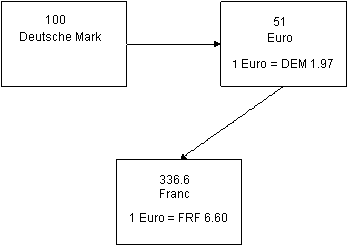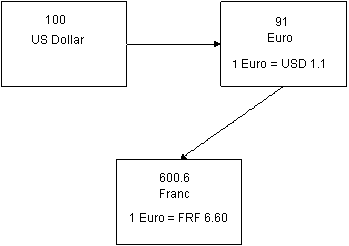
During a euro conversion interim period (when one or both of the currencies involved is a part-of-euro currency and neither currency is the euro), euro regulations prohibit direct currency conversions between participating countries. Therefore, to convert a monetary amount from one national currency to another, the system currency conversion process:
For example, to convert Deutsche marks to francs:

The same principle applies if your domestic currency is not part-of-euro, but you need to do business with a vendor or customer situated in a participating country who will be using the euro, but has not yet switched to it. The system conversion process
For example, to convert US dollars to francs:

The exchange rate between each participating national currency and the euro is fixed. If the currency is part-of-euro, this fixed exchange rate to the euro is stored in the system (on the Currency Codes form). There is only one exchange rate to the euro (1 euro =) for each part-of-euro currency there is no buy and sell rate.
Accepting Customer Payments in the euro Currency
Converting Customer Records to the Euro
Converting Vendor Records to the Euro
Converting the Domestic Currency to the euro
Revaluing Assets and Liabilities for the Euro
Customer Euro Currency Conversion
Customer Orders and Invoices in Foreign Currencies
Domestic Euro Currency Conversion